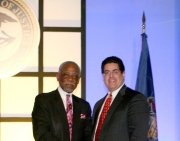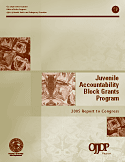
March/April 2008
OJJDP Conferences Reach Out to Faith-Based and Community Organizations
 OJJDP Administrator J. Robert Flores and Jedd Medefind, Special Assistant to the President and Deputy Director, White House Office of Faith-Based and Community Initiatives. |
 OJJDP Administrator J. Robert Flores presents his keynote remarks. |
As President Bush has made faith-based initiatives a priority, OJJDP has increased its training efforts to support these organizations in all aspects of their operations, from securing funding to managing their public outreach. The initiative supports policy development that removes obstacles to faith-based and community organizations' ability to compete for Federal grants and expands the funding opportunities that are open to these organizations.
In his keynote remarks, Administrator J. Robert Flores affirmed that outreach to faith-based and community groups is a priority for his office:
OJJDP is committed to ensuring a level playing field for faith-based and community organizations. The services they provide are integral to our efforts to prevent and address delinquency.
In addressing the audience, Administrator Flores noted that in addition to improving access to funding for faith-based and community organizations, providing training and technical assistance is crucial in preventing children from entering the juvenile justice system.
The Bush Administration has taken the mystery out of Federal funding and answered important questions that were keeping many of you from seeking Federal funds.
OJJDP is charged with assisting States and communities in addressing the needs of children in the juvenile justice system, however, we know that if they can be helped earlier and by these other systems, they may never darken our doors and that is a result we can all applaud.
The program agenda focused on four key topics: how to apply for government funding, how to attract private funding, managing financial growth, and managing and planning for organizational growth. In addition to hearing national experts in the field address how to attract and maintain both public and private funding, workshops provided specific and practical guidelines on how to meet the four main goals of the conference.
 OJJDP Administrator J. Robert Flores and Rev. Dr. W. Wilson Goode Sr., former Mayor of Philadelphia and Founder and Director of Amachi, a mentoring program for children of prisoners. |
OJJDP staff delivered presentations on various topics, including how to identify Federal funding opportunities and tips for preparing effective grant proposals. Setting performance measures for programs and addressing them in the grant-writing process also was discussed during the sessions. Identifying and setting performance measures is particularly helpful as the White House is placing greater emphasis on performance measures and use of the Performance Assessment Rating Tool during the budgeting process.
Use of OJJDP's Socioeconomic Mapping and Resource Topography (SMART) system also was discussed in its relation to securing project funding. SMART is a Geographic Information System and Web-based mapping application that illustrates specific geographic areas of crime and delinquency, and the nearby governmental and community resources that are available to prevent and control them. For more information on SMART, see the story in the May/June 2007 issue. www.ncjrs.gov/html/ojjdp/news_at_glance/218233/topstory.html
Administrator Flores Stresses Preventive Measures at 24th National Symposium on Child Abuse
 From left to right: Ron Laney, Associate Administrator, Child Protection Division, OJJDP; Ernie Allen, President and CEO, National Center for Missing & Exploited Children; Chris Newlin, Executive Director, National Children's Advocacy Center; David Tyree, NFL player; and J. Robert Flores, Administrator, OJJDP, at the National Symposium on Child Abuse in Huntsville, AL. |
OJJDP Administrator J. Robert Flores addressed the National Children's Advocacy Center's (NCAC) 24th National Symposium on Child Abuse during its annual conference held March 17–20, 2008, in Huntsville, AL.
With a particular focus on providing training for those working in the field, the symposium offered more than 130 workshops for the 1,200 law enforcement officers, child protective service workers, program administrators, prosecuting attorneys, medical personnel, mental health and treatment providers, victim advocates, and other specialists in attendance.
One of NCAC's two annual conferences, this symposium provided state-of-the-art approaches on a broad range of topics, including prosecuting child offenders, conducting forensic interviews, child protection investigation strategies, rights of child victims in criminal cases, the use of ethics and documentation, and the commercial sexual exploitation of children.
Administrator Flores praised the efforts of those attending and offered continued support for them to serve the Nation's children with the highest standards of excellence as he delivered the opening remarks on March 18, 2008.
OJJDP is deeply committed to assisting law enforcement, court personnel, child and family service providers, advocates, and lay community members to develop a more effective and compassionate response to child victims and to hold adults responsible for maltreating children.
Administrator Flores stressed that protecting children from child abuse and neglect includes offering preventive services to support parents in minimizing the stresses of raising children. In this way, parents gain the resources and strengths they need to overcome situations that may lead to abuse and neglect. Such services include:
Supporting parents in developing nurturing behaviors and fostering parent-child attachment, making sure parents are educated about effective parenting strategies and child and youth development, and assessing and fostering parental resilience to deal with the physical and emotional challenges of raising children.
Also during the symposium, NCAC awarded the Outstanding Service Award to Ron Laney, Associate Administrator of OJJDP's Child Protection Division (CPD). Recognizing Mr. Laney's more than 31 years of service and contributions in the field, the award is the first of its kind to be given to an individual who has made a difference in the child protection field.
CPD supports a range of programs related to child protection, including preventing child abuse and neglect, addressing crimes against children, and reducing children's exposure to violence. Training, intervention, and prevention programs in this area in 2008 will include:
- NCAC is providing a variety of services for child protection professionals including training, intervention, prevention, and treatment. Training for child abuse professionals covers professional development, community leadership, and prevention conferences.
- Four regional child advocacy centers, in Colorado Springs, CO; St. Paul, MN; Philadelphia, PA; and Huntsville, AL, provide information, technical assistance, and training on child protection at the local, State, regional, and national levels as well as services targeted to each specific geographical region.
- The National Children's Alliance, a membership organization of children's advocacy center programs, provides training, technical assistance, and networking opportunities to local children's advocacy center programs.
- The National Court Appointed Special Advocates Association (NCASAA) supports the expansion of CASA programs in areas where services are limited. One of NCASAA's goals is increased recruitment of Hispanic-American and African-American volunteers.
- The National Council of Juvenile and Family Court Judges' Model Courts Project is implementing innovative reforms and best practices in how juvenile and family courts, social service agencies, and the broader child welfare community respond to child abuse and neglect cases. Reforms are tested at the local level and then disseminated regionally and nationally based on the most successful programs.
- The Child Abuse Training Programs for Judicial Personnel and Practitioners offer court improvement training programs, provide technical assistance on dependency court best practices, and disseminate information for the purpose of improving courts' handling of child abuse and neglect cases nationwide.
- The Child Abuse Investigation and Prevention Program is providing training and technical assistance services to child abuse professionals who work with abused children and their families. Training is offered to psychologists, investigators, detectives, medical services personnel, and prosecutors at the local, State, and national levels.
Administrator Flores Addresses Working Group on Internet Child Safety
OJJDP Administrator J. Robert Flores addressed a working group meeting on a Multi-Pronged Approach to Internet Child Safety, March 27, 2008, in Boston, MA.
The intensive 2-day workshop and conference convened individuals from across the United States, all experienced in the area of online child sexual victimization, to share ideas and information.
In his remarks to the group, Administrator Flores said all preventive measures must be fully availed, and that the danger to children could not be understated, noting:
Juveniles make up 12 percent of all crime victims coming to police attention, including 71 percent of all sex crime victims and 38 percent of all kidnapping victims.
The event included a class on forensic mental health, a panel discussion on pornography and online offenders, and numerous guest speakers in addition to Administrator Flores.
The working group was spurred by a joint effort between the Justice Resource Institute, Boston College, and Villanova University. The primary goal of their proposed research is to reduce online sexual victimization of children and adolescents by using a multipronged approach to examine the problem from multiple perspectives. A secondary goal of the project is to study the evolution and impact of adult and child pornography on Internet sexual offenders.
This 2-year project proposes to build on pilot work supported by OJJDP in three important ways:
- Conducting in-depth structured interviews of a large, diverse sample of Internet sexual offenders.
- Examining the age spectrum of exposure to, use of, and technical familiarity with Internet pornography among high school students, college students, and offenders.
- Reviewing the efficacy of existing child protection software with recommendations for the next "generation" of such filters.
The proposed project is intended to advance the much-needed empirical research required to combat online sexual victimization of children and adolescents and improve Internet safety strategies.
Deputy Administrator Speaks at Blueprints Conference
The Blueprints for Violence Prevention initiative held its annual conference March 17–19, 2008, in Denver, CO. Nancy Ayers, OJJDP's Deputy Administrator for Policy, offered opening remarks.

The Blueprints initiative is headquartered at the Center for the Study and Prevention of Violence at the University of Colorado in Boulder. Blueprints reviews violence prevention program evaluations, designates model and promising programs, and provides training and technical assistance in selecting and implementing these programs. OJJDP became an active supporter shortly after the initiative began in 1996 and has provided funding to sponsor program replications in sites across the United States.
In her remarks, Ayers characterized the Blueprints initiative:
Its influence on the field of juvenile justice and youth programming has been far-reaching, not only in providing clear and rigorous guidelines for how to conduct evaluation, but in raising the standards for the funding of programs at the local, State, and Federal levels.
Ayers continued on the subject of evaluation and evidence-based standards:
I am pleased to tell you that among the performance measures that OJJDP tracks—and reports to the Office of Management and Budget—is the percentage of our grantees who are implementing evidence-based programs and practices. I believe we are the only Federal youth-serving agency that reports this information.In 2006, 46 percent of our grantees were operating evidence-based programs.
OJJDP has incorporated language in all of our solicitations for grant applications that strongly urges applicants to institute evidence-based programs and practices. As a result, we at OJJDP anticipate that the number of our grantees who embrace evidence-based programming will continue to grow.
Ayers concluded by noting that OJJDP chose the Blueprints conference to distribute advance copies of the first in a series of bulletins on the findings from OJJDP's Girls Study Group.
OJJDP convened the study group to broaden understanding of the risk and protective factors associated with female juvenile offending and the consequences for youth involved in such offending. The group also is working to identify effective strategies for communities to use in their efforts to prevent and reduce female involvement in delinquency and violence.
OJJDP is excited by the findings from the study group, which show, among other things, that although the rate of girls entering the juvenile justice system has increased, the actual incidence of their being seriously violent has not changed much over the last two decades. OJJDP hopes these findings will spark further research and discussion about the context and circumstances of girls in the juvenile justice system.
For more on the Girls Study Group Bulletin series see the Blueprints Conference 2008 Web site.
Training Sessions Held for Disproportionate Minority Contact Coordinators
 Attending DMC training in Phoenix are (from left to right) Ed Chargualaf of HI; Bill Feyerherm, PhD, Provost for Research and Programs, Portland State University; Ron King of TN; Ron Keen of DE; Trainer Heidi Hsia, PhD, then-OJJDP DMC Coordinator; Lindsey Draper of WI; Marcia Ballas of VT; Cil Robinson of MT; Christine Wallace of SC; Brad Richardson of IA; Carisa Dwyer of AZ; Trainer Marcia Cohen, vice president, Development Services Group; Vicki Taylor of TN; Trainer Tom Begich, JJ consultant; Jim Antal of OJJDP, State Representative; Trainer Tom Harig, PhD, New York State DMC Coordinator. |
OJJDP held two training sessions for disproportionate minority contact (DMC) coordinators in January and February 2008, one for novices and one for more experienced practitioners.
The first session, "Training for New DMC Coordinators," was held January 28–30 in New Orleans, LA. Fifteen new State DMC Coordinators and four OJJDP staff members participated in this intensive 3-day training that focused on the role of a DMC coordinator, the ability to communicate clearly what DMC is, how to measure it, and how to design evidence-based strategies to reduce it. The experience of the coordinators in attendance ranged from 2 weeks to 1 year. The training sessions offered instruction on how to help community groups and their State Advisory Groups work collaboratively, systematically, and continuously toward DMC reduction. Sessions had an additional emphasis on how to perform coordinator duties, such as how to develop and write an effective DMC compliance plan.
"DMC Training of Trainers for Experienced DMC Coordinators" was held in Phoenix, AZ, February 25–27. Nine experienced State DMC Coordinators from eight States, one new State juvenile justice specialist, and two OJJDP staff members participated in the intensive 3-day training. The training was designed to enhance the skills of experienced DMC coordinators so they can effectively train and guide communities within their States on DMC reduction. Instruction also focused on enhancing participants' communication and group facilitation skills.
For more information on OJJDP's DMC activities, see the OJJDP Web site.
OJJDP To Host National Youth Gang Symposium in June 2008

The 2008 OJJDP National Youth Gang Symposium will take place June 23–26 in Atlanta, GA. The theme this year is "Partnering to Prevent Youth Gang Violence: From Faith-Based and Community Organizations to Law Enforcement." OJJDP's cosponsors are the National Youth Gang Center. The event will offer innovative and successful gang prevention programs and strategies, as well as provide the latest information on youth gang activities and trends from top national experts.
This year's theme captures a central concept in OJJDP's approach to addressing the gang problem. Through close collaboration, pooled knowledge and resources, and coordinated services, we can effectively intervene in the lives of gang-involved youth and redirect them to a more positive, productive path.
Who Should Attend?
This symposium is designed for anyone involved in addressing our Nation's youth gang and violence issues:
- School personnel
- School resource officers/G.R.E.A.T. officers
- Local Boys & Girls Clubs staff
- Community-based organizations staff
- Youth-development professionals
- Law enforcement
- Court, probation, and corrections professionals
- Prosecutors
- Researchers
- Government agencies and elected officials
- Youth leaders
- Faith-based organizations
Sessions
The symposium will offer breakout sessions filled with information, strategies, and promising/best practices from multiple perspectives in the field dealing with youth gang issues. Sessions will apply to those working in law enforcement, State or local government, community or faith-based organizations, the justice system, or schools.Session topics include:
- Gang awareness with a national and regional focus
- Brown/black gang conflicts
- Gangster rap
- Gangs in Indian Country
- Female gangs
- School-based prevention and intervention programs
- Partnering within the community
- Evaluation and performance measures
- Sustainability and funding
- Working with the media
- Employment programs that work for gang-involved youth
- Serving gang-involved families
- Alternatives to incarceration
- Targeted reentry
Presymposium Workshops
Specialized workshops will be offered prior to the symposium to allow participants to spend an entire day concentrating on a subject of interest. The workshops will take place on Monday, June 23, the day before the symposium begins.Presymposium workshops being offered are:
- National Gang Trends (Gangs 101)
- The Evolving Role of Girls in Gangs
- Classroom Management and Student Discipline
- Team-Based Gang Intervention
- Community Connection: Building a Collaboration
- Gang Prevention Through Targeted Outreach
- From Risk to Revenue: Employment Issues for Gang-Involved Youth
- Gang Prosecution Strategies
- Outreach to Gang Members and Their Families
- Conducting a Comprehensive Gang Assessment
For detailed information, including a complete list of breakout sessions and descriptions of presymposium workshops, visit the registration is available.
New Publications
 Juvenile Accountability Block Grants Program: 2005 Report to Congress
Juvenile Accountability Block Grants Program: 2005 Report to Congress
Since 1998, OJJDP has helped States and communities implement accountability-based reforms designed to reduce juvenile offending through the Juvenile Accountability Block Grants (JABG) program. The JABG program supports innovative, effective programs that focus on both offenders and the juvenile justice system. This Report presents findings from the second round of performance measurement data (for the reporting period of April 1, 2004, through March 31, 2005) collected from the States and territories and analyzed by OJJDP. The Report also outlines the history of the JABG program, OJJDP's development of the JABG performance measurement system, and how JABG expenditures have affected State and local juvenile justice infrastructures and practices. The Report concludes with a section that highlights OJJDP's plans to enhance the program.

Coming Soon: Girls Study Group Bulletin Series
According to data from the Federal Bureau of Investigation, from 1991 to 2000, arrests of girls increased more (or decreased less) than arrests of boys for most types of offenses. By 2004, girls accounted for 30 percent of all juvenile arrests. However, questions remain about whether these trends reflect an actual increase in girls' delinquency or changes in societal responses to girls' behavior.
To find answers to these questions, OJJDP convened the Girls Study Group to establish a theoretical and empirical foundation to guide the development, testing, and dissemination of strategies to reduce or prevent girls' involvement in delinquency and violence.
OJJDP is producing a Girls Study Group Bulletin series to present the Group's findings. The series will examine issues such as patterns of offending among adolescents and how they differ for girls and boys; risk and protective factors associated with delinquency, including gender differences; and the causes and correlates of girls' delinquency. The titles in this series will be announced in the publications section of this newsletter and on OJJDP's Web site as they are available.
 News From the Coordinating Council on Juvenile Justice and Delinquency Prevention
News From the Coordinating Council on Juvenile Justice and Delinquency Prevention
The Coordinating Council on Juvenile Justice and Delinquency Prevention (Council) met on March 7, 2008. Council members heard presentations on:
- Drug abuse and public health challenges among youth.
- Random student drug testing. [Microsoft PowerPoint]
- The National Youth Anti-Drug Media Campaign.
- The Drug-Free Communities program. [Adobe PDF]
- Prescription drug abuse [Microsoft PowerPoint] and online pharmacy threats.
- Treatment for children of drug offenders and drug addicts.
- OJJDP's SMART system.
- Youth-related solicitations from member agencies.
Members also received updates on an OJJDP/SAMHSA interagency agreement [Rich Text File] and pending Federal legislation [Microsoft Word]. The Council's next scheduled quarterly meeting is June 6, 2008.
For meeting summaries, information about the Council's mission, and links to related resources, visit the Council's Web site at www.juvenilecouncil.gov.
|
 News From the Advisory Committee on Juvenile Justice
News From the Advisory Committee on Juvenile Justice
The Spring meeting of the Federal Advisory Committee on Juvenile Justice (FACJJ) was held April 6, 2008, at the Washington Plaza Hotel, 10 Thomas Circle NW., Washington, DC, and April 7–8, 2008, at the U.S. Department of Justice, Office of Justice Programs, 810 Seventh Street NW., Washington, DC. Advisory committee members heard presentations on preventing sexual exploitation in youth facilities and compliance monitoring before finalizing the 2008 draft reports to the President and Congress and to the Administrator.
FACJJ meetings are public and anyone may register to attend and observe. For additional information, including information on past meetings, visit FACJJ's Meetings Web page.
|
OJJDP Staff News
March marked the retirement of a long-time OJJDP staff member. OJJDP Administrator J. Robert Flores poses with Heidi Hsia at her retirement breakfast. |
Heidi Hsia, Ph.D., retired March 25 as OJJDP's Disproportionate Minority Contact (DMC) Coordinator. Heidi joined OJJDP's State Relations and Assistance Division (SRAD) as a State Representative in 1996 before becoming the Title V and State Challenge Program Manager, and ultimately the DMC Coordinator. While in SRAD, she championed for strong prevention-focused programming and always encouraged the use of evidence-based programming. As the DMC Coordinator, she greatly enhanced the office's DMC efforts by strengthening the review of State DMC Plans, creating the OJJDP DMC webpage, developing a range of publications and technical assistance resources, designing trainings, and serving as a central resource for the field. Through her dedication to raising the awareness about the importance of DMC across the Nation, 33 States now have DMC Coordinators focusing on the issue where previously there were none. Heidi's passion for DMC inspired others in OJJDP and the field of juvenile justice to work tirelessly and creatively on DMC projects. Prior to her tenure with OJJDP, Heidi worked in mental health and victim services for many years in Montgomery County, Maryland.
State Contacts | Publications | Statistics | Events